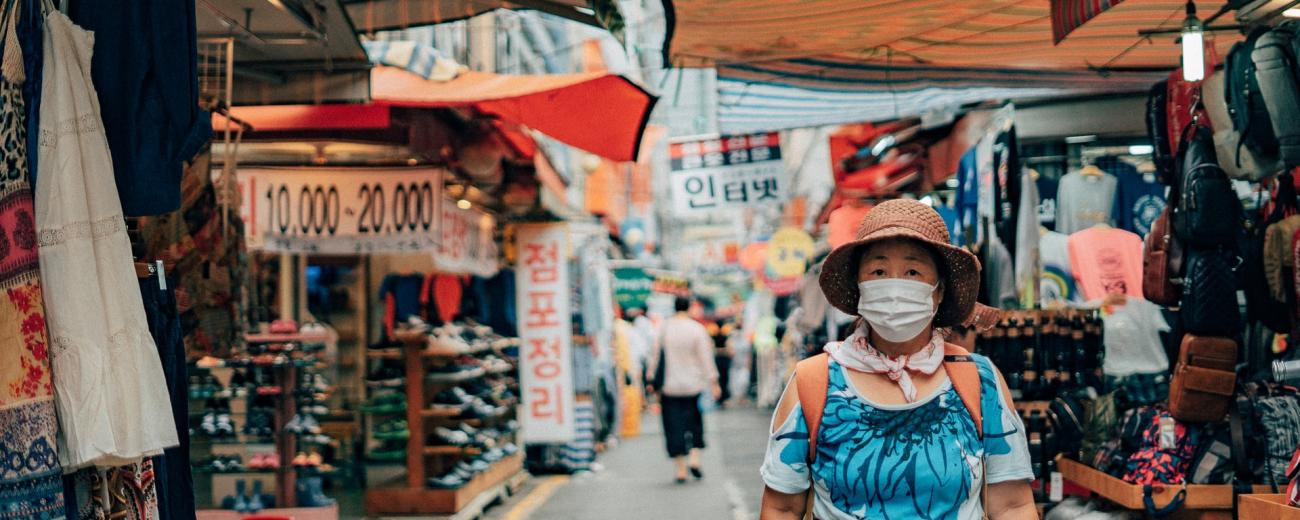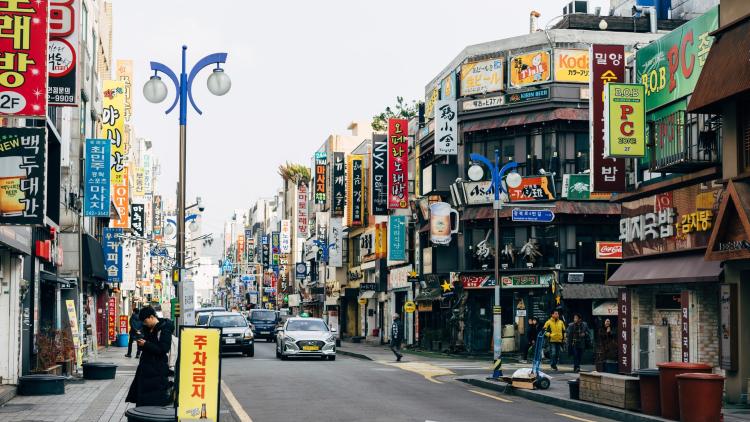BA East Asian Studies


Key information
- Duration
- 3 years
- Start of programme
- September
- Attendance mode
- Full-time
- Location
- Russell Square, College Buildings
- Fees
-
Home student fees: £9,250
Overseas student fees: £21,990Please note that fees go up each year.
See undergraduate fees for further details. - Course code
- UGSF0069
- Entry requirements
-
ABB
Contextual: BBB
-
Austria: Reifeprufungszeugnis / Maturazeugnis: four subjects at 1, 2, 2, 2
A Level equivalent: ABB
Contextualised offer: BBB -
Belgium: Diploma van Secundair Onderwijs: 75% (7.5/10, 15/20) overall
A Level equivalent: ABB
Contextualised offer: BBBInformation for prospective students from Belgium
-
Bulgaria: Diploma za Zavarsheno Sredno Obrazovanie: 5.3 and 5.0 in two State Maturity Exams
A Level equivalent: ABB
Contextualised offer: BBB -
Canada: High School Diploma: 80% with 5 acceptable Grade 12 subjects (most territories).
British Columbia: AABBB in Grade 12 courses.A Level equivalent: ABB
Contextualised offer: BBBInformation for prospective students from Canada
-
China: Senior Secondary Graduation Certificate + Gaokao: 78% overall in Gaokao PLUS 85% overall in Senior Secondary School Graduation Certificate (year 11 and 12)
A Level equivalent: ABB
Contextualised offer: BBBInformation for prospective students from China
-
Croatia: Matura Certificate: 4.5 overall with 5 in 1 Higher level subject
A Level equivalent: ABB
Contextualised offer: BBB -
Cyprus: Apolytirion with 2 A-Levels: Apolytirion 18/20 + A-level grades BB
A Level equivalent: ABB
Contextualised offer: BBB -
Czech Republic: Matura Certificate: 1, 2, 2, 2
A Level equivalent: ABB
Contextualised offer: BBB -
Denmark: Studentereksamen; Hojere Forberedelseseksamen; Hojere Handelseksamen; Hojere Teknisk Eksamen: 7 plus 10, 7, 7 in three Level A subjects
A Level equivalent: ABB
Contextualised offer: BBBInformation for prospective students from Denmark
-
Estonia: Gümnaasiumi lõputunnistus with the Riigieksamitunnistus: 4.0 with 85%, 80%, and 80% in 3 state exams
A Level equivalent: ABB
Contextualised offer: BBB -
Finland: Ylioppilastukint / Studentexamen: four subjects at 6, 5, 5, 5
A Level equivalent: ABB
Contextualised offer: BBB -
France: French Baccalaureat or Option Internationale du Baccalauréat (OIB): 13/20
A Level equivalent: ABB
Contextualised offer: BBBInformation for prospective students from France
-
Germany: Abitur: 1.8
A Level equivalent: ABB
Contextualised offer: BBBInformation for prospective students from Germany
-
Greece: Apolytirion of Geniko Lykeio with Pan Hellenic exams: 18/20
A Level equivalent: ABB
Contextualised offer: BBBInformation for prospective students from Greece
-
Hong Kong: Hong Kong Diploma of Secondary Education: 544 in two electives and one core (all other subjects grade 3)
A Level equivalent: ABB
Contextualised offer: BBBInformation for prospective students from Hong Kong
-
Hungary: Matura (Erettségi): 4.5 overall
A Level equivalent: ABB
Contextualised offer: BBB -
Iceland: Stúdentspróf: 7.5
A Level equivalent: ABB
Contextualised offer: BBB -
India: Standard XII: 75% (CBSE, CISCE, Tamil Nadu, Maharashtra & West Bengal boards), 80% (all other state boards)
A Level equivalent: ABB
Contextualised offer: BBBInformation for prospective students from India
-
Ireland: Irish Leaving Certificate: H1, H2, H2, H3, H3
A Level equivalent: ABB
Contextualised offer: BBB -
Israel: Bagrut: Overall grade of 7, 80% with 3 subjects at 5-unit level
A Level equivalent: ABB
Contextualised offer: BBBInformation for prospective students from Israel
-
Italy: Diploma Consequito con L’Esame di Stato: 80% overall
A Level equivalent: ABB
Contextualised offer: BBBInformation for prospective students from Italy
-
Latvia: Certificate of General Secondary Education: 88% in four State subject exams
A Level equivalent: ABB
Contextualised offer: BBB -
Lithuania: Brandos Atestatas: 8.5/10 and 90%, 85%, 85% in three State Exam
A Level equivalent: ABB
Contextualised offer: BBBInformation for prospective students from Lithuania
-
Malta: Advanced Matriculation Certificate: AB (Advanced) + BBB (Intermediate)
A Level equivalent: ABB
Contextualised offer: BBB -
Netherlands: Voorbereidend Wetenschappelijk Onderwijs: 7.5 overall with 8, 8, 7, 7 in four subjects
A Level equivalent: ABB
Contextualised offer: BBB -
Norway: Vitnemål vidergaende opplaering: 4.3 overall
A Level equivalent: ABB
Contextualised offer: BBBInformation for prospective students from Norway
-
Poland: New Polish Matura: 75% in three Advanced Level subjects
A Level equivalent: ABB
Contextualised offer: BBBInformation for prospective students from Poland
-
Portugal: Diploma de Ensino Secundario: overall 17.5/20
A Level equivalent: ABB
Contextualised offer: BBB -
Romania: Diploma de Bacalaureat: 8.5 overall
A Level equivalent: ABB
Contextualised offer: BBBInformation for prospective students from Romania
-
Singapore: Polytechnic Diploma (Nanyang, Ngee Ann, Singapore, Temasek and Republic Polytechnic): GPA 3.3
A Level equivalent: ABB
Contextualised offer: BBBInformation for prospective students from Singapore
-
Slovakia: Maturitná skúška / Maturita / Vysvedčenie o maturitnej skúške: four subjects at 1, 2, 2, 2
A Level equivalent: ABB
Contextualised offer: BBB -
South Africa: National Senior Certificate: 77666
A Level equivalent: ABB
Contextualised offer: BBBInformation for prospective students from South Africa
-
Spain: Curso de Orientación Universitaria / Título de Bachillerato: 7.5
A Level equivalent: ABB
Contextualised offer: BBBInformation for prospective students from Spain
-
Sweden: Slutbetyg / Examensbevis från Gymnasieskolan: A in 1200 credits and no grades below D / 18 / mainly B overall (MVG/VG)
A Level equivalent: ABB
Contextualised offer: BBB -
Switzerland: Federal Maturity Certificate: 4.5
A Level equivalent: ABB
Contextualised offer: BBB -
Tanzania: Advanced Certificate of Secondary Education: ACSE with BBB in 3 principle subjects
A Level equivalent: ABB
Contextualised offer: BBB -
Trinidad and Tobago: CAPE: Six CAPE units with grade 2 (+two double-unit courses)
A Level equivalent: ABB
Contextualised offer: BBB -
Turkey: Lise Diplomasi: 78-83% (depending on high school)
A Level equivalent: ABB
Contextualised offer: BBB -
USA: High School Diploma plus ACT, SAT, or AP exams:
-
High School Diploma GPA 3.0 plus SAT 1280 or ACT 27 and 2 AP's at 4,4
or -
High School Diploma GPA of 3.2 plus 2 AP's at 4,4
or -
High School Diploma GPA 3.4 plus SAT 1300 or ACT 29
or -
2-year Associate degree GPA 3.1
A Level equivalent: ABB
Contextualised offer: BBB -
-
See undergraduate entry requirements and English language requirements for international and alternative entry requirements.
Course overview
The BA East Asian Studies combines the study of both East Asian languages and East Asia-related subjects in various disciplines.
In this degree, there is a far greater emphasis on gaining a broader understanding of East Asia as a region, across a wide range of disciplines, than in our region-based degrees.
In addition to the disciplinary modules, you will be also able to study a Chinese, Japanese or Korean language module each year. The flexible structure of the degree allows you to study a different language each year or to progress through a sequence of levels in just one language. We can accommodate complete beginners or more experienced learners.
Progression through a total of four levels of language (up to approximately C1 in the CEFR) is offered, whereas for those who exceed the highest level, language-based modules in literature and film, as well as a language-based dissertation, are available.
Why study East Asian Studies at SOAS?
- SOAS is ranked 12th in the UK for Modern Languages (QS World University Rankings 2023)
- Ranked 10th in the UK for East Asian Studies (2022 Complete University Guide)
- SOAS is home to the largest concentration of East Asian specialists in Europe
Structure
Students take 120 credits per year composed of core, compulsory and guided modules.
- Year 1: students take 30 credits of East Asian history, 15 credits of academic writing, 30-60 credits of language, and 15 to 45 credits of popular culture.
- Year 2: student continue with language learning, either on the same language as studied in Year 1 or on another East Asian language module at an approved level. Modules on culture, history, literature are also available this year.
- Year 3: student continue with language learning, either on the same language studies previously or on another East Asian language module at an approved level. Student will write an Independent Study Project in their final year. Further modules on culture, history, literature are also available this year.
Important notice
The information on the website reflects the intended programme structure against the given academic session. The modules are indicative options of the content students can expect and are/have been previously taught as part of these programmes. However, this information is published a long time in advance of enrolment and module content and availability is subject to change.
Year 1
Language modules
Students will take 30-60 credits of language modules form the list below.
Students may take the 60 credit language in year 1 only. This will enable them to transfer to the language programme and go on a year abroad.
Year 1
Guided options
Students will take 15-45 credits from the Year 1 options list below
Note
Students may take the 60-credit language module in year 1 to enable them to transfer to the BA Chinese/BA Japanese/BA Korean (single and joint honours) in accordance with the language studied intensively. This will enable students to go on a year abroad in year 3. Students need to submit a degree transfer request by the appropriate deadline as published on the website to be eligible to go abroad.
Students are not permitted to take two ab initio language modules at the same time.
| Module | Credits |
|---|---|
| China in Ten Words: Key Concepts in Chinese Studies | 15 |
| K-Culture | 15 |
| Cool Japan: Manga, Anime, Sushi | 15 |
Year 2
Compulsory modules
| Module | Credits |
|---|---|
| East Asian Imperialisms | 15 |
| Myths, Legends and Folkways of East Asia | 15 |
And
30-45 credits from the list below:
| Module | Credits |
|---|---|
| Contemporary Chinese Society | 15 |
| Contemporary Japanese Society | 15 |
| Contemporary Korean Society | 15 |
Year 2
Language modules
Students will take modules to the value of 30 credits from the language list below
Year 2
Guided options
Students choose 30 credits of language from the list below
And
Either
30 credits of another language from the list below
Or
Up to 30 credits from List A or the Central Options bank
Note
Students are not permitted to take two ab initio language modules at the same time.
Year 3
Compulsory modules
| Module | Credits |
|---|---|
| History and Memory in East Asian Cultures | 15 |
| Independent Study Project in East Asian Studies | 30 |
Year 3
Language modules
Students will take modules to the value of 30 credits from the language list below
Year 3
Guided options
Students should choose 30 credits of language from the list below
And
Up to 45 credits from List B and/or the language list below.
Note
Students are not permitted to take two ab initio language modules at the same time.
| Module | Credits |
|---|---|
| China in Ten Words: Key Concepts in Chinese Studies | 15 |
| K-Culture | 15 |
| Cool Japan: Manga, Anime, Sushi | 15 |
List A
Guided option modules
Please note: Introduction to Pre-Modern Japanese; Classical and Literary Chinese 1; and Introduction to Hanja can only be taken with the relevant modern language component (and permission).
List B
Guided option modules
Some modules below may have a language requirement.
Language modules
| Module | Credits |
|---|---|
| Ch 100: Elementary Chinese | 60 |
| Chinese 1 A | 15 |
| Chinese 1 B | 15 |
| Chinese 2 | 30 |
| Chinese 3 | 30 |
| Chinese 4 | 30 |
| Chinese 5 | 15 |
| Ch 200 Intermediate Chinese | 30 |
| Chinese for Business | 15 |
| Ch 401: Chinese-English Translation | 15 |
| Japanese 1 A | 15 |
| Japanese 1 B | 15 |
| Japanese 2 | 30 |
| Japanese 3 | 30 |
| Japanese 4 | 30 |
| J200: Intermediate Japanese (30Cr) | 30 |
| J401: Japanese-English Translation | 15 |
| K100: Elementary Korean | 60 |
| Korean 1 A | 15 |
| Korean 1 B | 15 |
| Korean 2 | 30 |
| Korean 3 | 30 |
| Korean 4 | 30 |
| K200 Intermediate Korean | 30 |
| K400: Advanced Korean | 15 |
| K401: Korean-English Translation | 15 |
Teaching and learning
All full-time undergraduate programmes consist of 120 credits per year , in modules of 60, 30 or 15 credits. They are taught over 10 or 20 weeks. The programme structure shows which modules are taught over one term or the full year. It also shows which modules are compulsory and which are optional.
Contact hours
As a rough guide, 1 credit equals approximately 10 hours of work. Most of this will be independent study. It will also include class time, which may include lectures, seminars and other classes. Some subjects, such as learning a language, have more class time than others.
Year abroad
The BA East Asian Studies does not include a year abroad.
SOAS Library
SOAS Library is one of the world's most important academic libraries for the study of Africa, Asia and the Middle East, attracting scholars from all over the world. The Library houses over 1.2 million volumes, together with significant archival holdings, special collections and a growing network of electronic resources.
Fees and funding
Fees for 2023/24 entrants per academic year
| Programme | Full-time | |
|---|---|---|
| Home students | Overseas students | |
| BA, BSc, LLB | £9,250 | £21,160 |
| BA/BSc Language year abroad | £1,385 | £10,580 |
Please note that fees go up each year. See undergraduate fees for further details.
Employment
Graduates from the Department of East Asian Languages and Cultures develop competencies in intercultural awareness, analysis and communication. Demand for specialists with advanced proficiency in the languages of China, Japan and Korea has significantly increased in recent years, and graduates with these skills are highly sought after by employers.
Recent graduates have been hired by organisations including:
- Accenture
- Amazon
- Bloomberg LP
- Department for Work and Pensions
- European Alliance for Human Rights in North Korea
- European Commission
- ITN
- Japanese Government
- Korea Trade Centre (KOTRA)
- KPMGMizuho Bank
- Nagahama Board of Education
- Nanjing Museum
- Pinsent Masons LLP
- PwC
- Seoul Metropolitan Government
- Shelterbox
- UNDP
Find out about our Careers Service.










